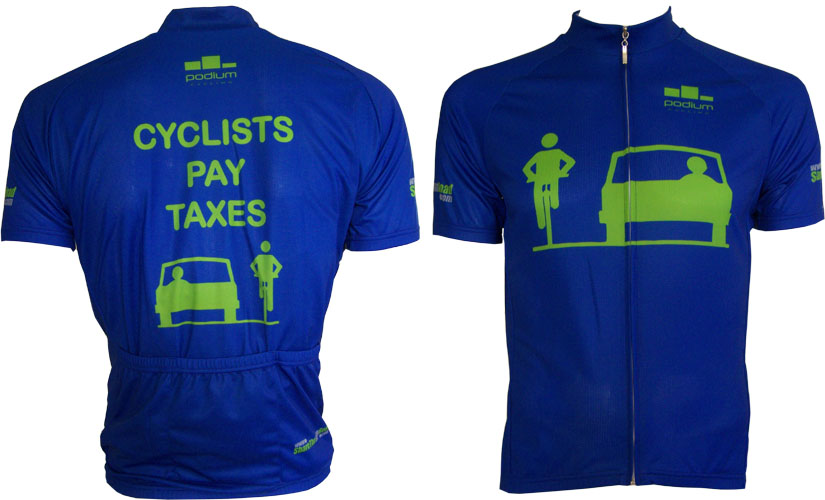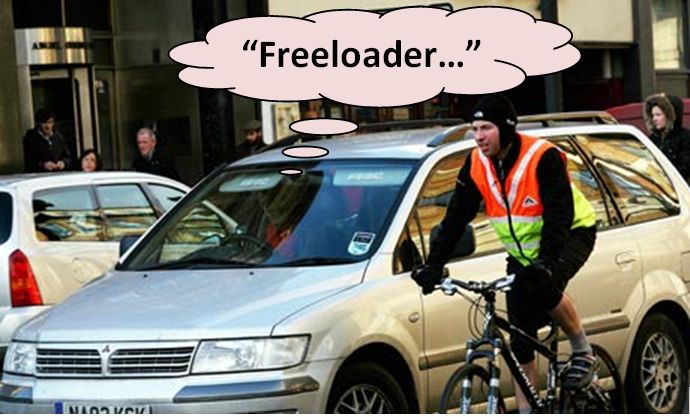One thing I have tried to do over time at CiC is to build up a few “go to” blog articles for those situations when you need some ammunition in a debate over cycling. The classic complaint that “cyclists get all these cycleways for free” is one such situation; hence the need for this post, first published in Feb 2013. Over the years it’s been heartening to see many people refer to it in online conversations…
Cycling has been in the media a bit lately and once again a familiar chorus has sprung up. It doesn’t matter whether you are talking funding for cycleways, whether to wear hi-vis clothing, or a high-profile cycle crash, inevitably someone in the blogosphere, Facebook, or letters to the editor pipes up and claims that “cyclists don’t pay”. More specifically, the complaints usually boil down to two things:
- Cyclists don’t pay petrol taxes, registration, or road user charges; therefore they have no legitimate right to use the road, nor to claim any special provision for cycling (in fact they should be grateful for what they do get given gratis)
- Cyclists also don’t pay ACC levies like motorists; thus they get free medical treatment too when they crash (and if they dare to do something like choose not to wear a helmet they shouldn’t even get that)
The reality is in fact far different. Yet despite pointing the facts out left, right, centre to anyone who’ll listen, it still keeps cropping up. So, if you get involved in a “robust” discussion about the contribution of cyclists to the upkeep of our transport and health systems, here are a few handy points to throw back.
Note: as many of you know, I don’t like the terminology “cyclist”; I’d rather think of “a person who happens to be cycling right now”. It’s potentially another argument against dividing people into those who pay and those who don’t. So, where possible, I have avoided talk about “cyclists” here.
First it’s useful to know what transport dollars are actually spent on. If we ignore public transport services and facilities, the majority (~52%) of road construction costs are actually spent on maintenance and renewals to repair worn out roads (although RoNS are trying to do their darndest to steal from this bucket of money too). The damage to roads from vehicles is roughly proportional to the weight on each wheel to the fourth power (it’s complicated by axle configuration, but let’s not go there). In other words, a 2 tonne late-model ute (current private car of choice in NZ) typically causes about 10,000 times more damage to a road than a 100kg bike and rider on two wheels, while a 30 tonne 18-wheeler truck might do more than 1 million times the damage. So basically a fair proportion of transport costs are simply covering the ongoing effects of cars and trucks on the roads; any damage to roads by bikes is negligible.
The balance is then spent (in theory) on the best solutions to resolve the various transport problems of congestion, safety, environmental impacts, etc. However, no-one said that the best solution was necessarily one based on who contributed the most for it. For example, the most cost-effective solution to dealing with congestion somewhere may be to provide good cycling alternatives, rather than increase road capacity for motor vehicles.
OK, where does the money come from? A large chunk of the transport money comes from petrol taxes, road user charges (what truckies pay), and motor vehicle registration fees. There’s also a small but growing amount coming from general taxation (e.g. anything you buy with GST on it) – update: and the new $100 million Urban Cycleways Fund is completely funded by general taxes, not road revenue. However, when it comes to local roads (where most people cycle) about 50% is paid for by local Council rates (in larger places like Christchurch, the proportion is typically a bit higher). In other words, anyone who owns or rents a home (i.e. most adults and by implication their dependants) is contributing to the transport provision in their area. Most cycling infrastructure costs considerably less than half the cost/km of equivalent motor vehicle infrastructure, so I think that even those who don’t cycle are getting a pretty good deal out of that.
I’ve heard a number of people use this argument: “as well as a bike I also own a car, therefore I do contribute to transport costs for cycling.” Well, it’s partly correct… remember that a large chunk of your petrol dollars are simply going towards fixing the roads that you damage by driving around. However, probably like me (also a car owner), you feel that a greater proportion of the balance should be spent on non-motor vehicle solutions to congestion, safety, etc, and that’s a perfectly valid viewpoint.
Now, what about ACC? Well, cycling injuries are covered by either Earner Levies (paid for by everyone who works) or the Govt’s Non-Earner Account (paid for by general taxation). So if you are working or paying GST, you are already contributing to the treatment costs for you and your dependants. So why do motorists have to pay an additional levy? Because they cost a lot more – on-road cycling accidents cost ACC ~ $18 million/year compared with >$450 million/year for motorists.
Sometimes someone will also demand that cyclists should also be licensed or pay a registration fee (should help track down all those law-breaking riders too…). But invariably, any places that have looked into such schemes have found that the costs of running them would pretty much outweigh the likely revenue or benefits. And if someone believes that licensing all cyclists will eliminate bad riding behaviour, they clearly haven’t been paying attention to the antics of all the licensed and registered drivers out there…
A more fruitful idea could be to simply add a levy onto each new bicycle imported and sold in the country. With over 200,000 bikes arriving each year, a (say) $20 levy would raise an extra $4 million a year. That’s not actually a lot, considering we already spend about $15-20 million/year (c.2013) nationally on walking/cycling facilities and that hardly goes anywhere near what is needed (certainly wouldn’t pay for $69m of Chch cycleways in a hurry…). But maybe if it was ring-fenced for cycling and driver education and training initiatives (like these), it might be quite a useful outcome (motorcyclists have done something similar with an annual safety levy). And it would have the distinct advantage of demonstrating a direct payment link for the “cyclists don’t pay” hardliners.
I haven’t even started to get on to how people who cycle also typically save the country in so many other ways economically, be it health, environment, oil imports, etc (and to be honest, those points can be a tough sell to the die-hard car-lover). But even with the above points, hopefully you can nullify the “cyclists don’t pay” side-tracking and get back to the real debate about how to provide for a better cycling environment.



You can apply the same argument for motorcyclists but they pay around $500 pa depending on engine size, the majority going to ACC levies. I’ve tried to get costs for cycling injuries but all I could find were figures for 2020 where $78 million was paid out but I think it is significantly more for 2023 getting close to motorcycle injury costs for that year. Additionally motorcycles don’t require any additional Infrastructure such as cycle lanes so make less demands on roading. Cyclists claim that every bicycle is one less car on the road but the fact is lanes available for cars have been reduced to provide for cycle lanes so no benefit for traffic congestion. Motorcycles filter through traffic and don’t hold up traffic so they are more beneficial for reducing congestion. I think cyclists should be charged an annual fee like all other road users as they cost the community considerably more that any benefit they claim they provide.
Looking at cycling overseas like Netherlands, which has a population 3 times that of NZ, over 200 cyclists are killed on roads each year and that is the most cycle friendly country in the world. If cycling becomes more popular on NZ expect similar fatality and injury statistics. I think cyclists are fooling themselves and others claiming it’s a safe and beneficial mode of transport. Their pedal machines won’t save the planet.
On-road motorcycling injuries account for nearly three times as many ACC claims as on-road cycling injuries – see https://www.acc.co.nz/newsroom/media-resources/road-injury-statistics/ . And the average claim cost for a motorcycle crash is also about three times that of the average cycling crash (~$30,000 vs ~$10,000) – one of the reasons why motorists of all forms pay additional ACC levies.
The Netherlands has that many cycle fatalities (sadly) because it has a much, much higher amount of cycling than NZ – on a per-km basis their cycle fatality rate is still only about 1/3 of ours. And on a per-capita basis, their road safety stats overall are still well below ours – which is kind of the point of the exercise…